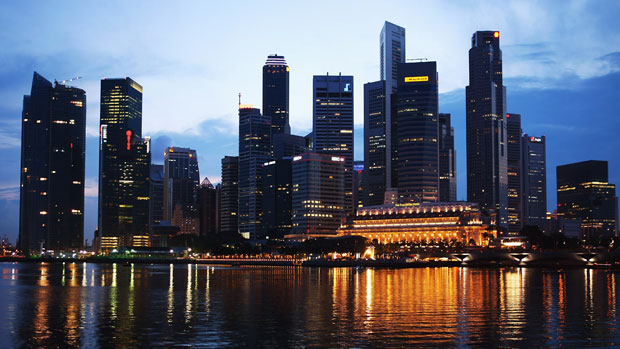How Singapore’s ‘fake news’ law works
Controversial bill allows authorities to flag and remove posts said to be false

A free daily email with the biggest news stories of the day – and the best features from TheWeek.com
You are now subscribed
Your newsletter sign-up was successful
Singapore has ushered in a new anti-fake news law that critics fear will be used to stifle dissent.
The Protection from Online Falsehoods and Manipulation Bill empowers ministers in the Asian city state to order social media sites to put warnings next to any post that the authorities deems to be false. It also allows the government to order that posts be taken down in extreme cases.
It is now illegal to spread “false statements of fact” in contexts in which the statements are considered “prejudicial” to Singapore’s security, public safety or “public tranquillity”. Statements that are deemed to threaten “friendly relations of Singapore with other countries” are also prohibited.
The Week
Escape your echo chamber. Get the facts behind the news, plus analysis from multiple perspectives.

Sign up for The Week's Free Newsletters
From our morning news briefing to a weekly Good News Newsletter, get the best of The Week delivered directly to your inbox.
From our morning news briefing to a weekly Good News Newsletter, get the best of The Week delivered directly to your inbox.
Individuals found to have violated the new law can face fines and up to ten years in prison, while companies found guilty of spreading “fake news” can face fines of up to S$1m (around £600,000).
Rights groups have repeatedly warned that the bill “could be subject to abuse and may have a stifling effect on free speech”, CNN reports.
The International Commission of Jurists (ICJ), a grouping of prominent judges and lawyers, has also said there is a “real risk that the law will be misused to clamp down on opinions or information critical of the government”.
Human Rights Watch Asia deputy director Phil Robertson told CNN that he expects the bill to be used for “political purposes”.
A free daily email with the biggest news stories of the day – and the best features from TheWeek.com
“The Singapore government has a long history of calling everything they disagree with as false and misleading,” he added.
Echoing those concerns, Nicholas Bequelin, Amnesty International’s regional director for East and Southeast Asia, said: “This is an alarming scenario. While tech firms must take all steps to make digital spaces safe for everyone, this does not provide governments an excuse to interfere with freedom of expression - or rule over the news feed.”
With general elections on the horizon, opposition leaders have also voiced fears that the law could be used to “muzzle dissent”, Bloomberg reports.
Responding to the concerns, the Singapore government has insisted that the bill is about “enabling” free speech rather than “controlling” it.
The most recent world rankings on press freedom by watchdog Reporters Without Borders puts Singapore came 151 out of 180 countries.
–––––––––––––––––––––––––––––––For a round-up of the most important stories from around the world - and a concise, refreshing and balanced take on the week’s news agenda - try The Week magazine. Get your first six issues for £6–––––––––––––––––––––––––––––––
-
 Will increasing tensions with Iran boil over into war?
Will increasing tensions with Iran boil over into war?Today’s Big Question President Donald Trump has recently been threatening the country
-
 Corruption: The spy sheikh and the president
Corruption: The spy sheikh and the presidentFeature Trump is at the center of another scandal
-
 Putin’s shadow war
Putin’s shadow warFeature The Kremlin is waging a campaign of sabotage and subversion against Ukraine’s allies in the West
-
 The pros and cons of social media
The pros and cons of social mediaPros and Cons Building connections, revolutionizing news and expanding horizons vs. concerns around mental health, fake news and privacy
-
 Free app access for The Week’s subscribers during Royal Mail strikes
Free app access for The Week’s subscribers during Royal Mail strikesSpeed Read If you have a subscription to The Week magazine you can read the digital edition on your tablet or phone
-
 Comic Relief to end ‘white saviour’ celebrity trips to Africa
Comic Relief to end ‘white saviour’ celebrity trips to AfricaSpeed Read Charity’s appeal videos described by critics as ‘poverty porn’ and ‘devoid of dignity’
-
 Prince Harry and Meghan Markle to star in ‘fly-on-the-wall’ Netflix reality show
Prince Harry and Meghan Markle to star in ‘fly-on-the-wall’ Netflix reality showSpeed Read Former minister accuses couple of ‘exploiting’ royal links with big-bucks deal
-
 Royal officials to ‘scrutinise’ Prince Harry and Meghan Markle’s $150m Netflix deal
Royal officials to ‘scrutinise’ Prince Harry and Meghan Markle’s $150m Netflix dealSpeed Read Duke and Duchess of Sussex have inked agreement to produce documentaries and films for the streaming service
-
 Prince Harry and Meghan Markle pitch mystery project idea to Hollywood
Prince Harry and Meghan Markle pitch mystery project idea to HollywoodSpeed Read The Sussex royals have been shopping their concept around tinseltown since June
-
 Meghan Markle ‘furious’ over Palace’s failure to defend her ‘against true stories’
Meghan Markle ‘furious’ over Palace’s failure to defend her ‘against true stories’Speed Read Legal documents say she felt unprotected by the royal ‘institution’ - but insiders claim press team were powerless
-
 Ronan Farrow: is Harvey Weinstein’s arch-enemy ‘too good to be true’?
Ronan Farrow: is Harvey Weinstein’s arch-enemy ‘too good to be true’?Speed Read Pulitzer-winning #MeToo journalist rejects New York Times columnist’s allegations of ‘shakiness’ in his work